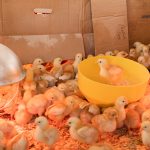Chickens require specific care during cold weather to maintain their health and well-being. While generally hardy, chickens can be adversely affected by winter conditions if not properly managed. A warm, dry environment is essential for chickens in cold weather.
This necessitates a well-insulated coop that protects against drafts and moisture, as chickens are prone to respiratory issues in damp, drafty conditions. However, adequate ventilation is also crucial to ensure fresh air circulation. Nutrition is another critical factor for chickens in cold weather.
Their energy requirements increase to maintain body heat, so their diet should be adjusted accordingly. A high-quality feed rich in protein and essential nutrients is necessary. Supplemental treats like scratch grains, mealworms, and fresh produce can provide additional nutrition and stimulation.
Access to unfrozen water is vital for chickens year-round, including during winter. Ensuring a constant supply of clean, liquid water is essential for their health and hydration. By addressing these fundamental needs – shelter, nutrition, and water – chicken owners can help their flocks thrive during cold weather conditions.
Table of Contents
- 1 Creating a warm and cozy coop for winter
- 2 Providing extra nutrition for chickens during the cold months
- 3 Managing a broody hen in cold weather
- 4 Protecting chickens from frostbite and other cold-weather hazards
- 5 Tips for keeping water from freezing in winter
- 6 Monitoring the health and well-being of chickens during colder months
- 7 FAQs
- 7.1 What are some tips for keeping chickens in cold weather?
- 7.2 How can I keep my broody hen warm in cold weather?
- 7.3 What are some signs that my chickens are too cold?
- 7.4 Should I use a heat lamp in the chicken coop during cold weather?
- 7.5 How can I prevent frostbite in my chickens during cold weather?
Key Takeaways
- Chickens need a draft-free and well-ventilated coop in cold weather to stay healthy and comfortable
- Use insulation, heat lamps, and deep bedding to create a warm and cozy environment in the coop for chickens during winter
- Provide extra nutrition such as high-protein treats and increased feed rations to help chickens stay warm and maintain their energy in cold weather
- Manage a broody hen by providing a separate warm and quiet space with extra bedding and food and water close by
- Protect chickens from frostbite by applying petroleum jelly to combs and wattles and keeping the coop dry and free from drafts
- Use heated waterers or add insulation to water containers to prevent water from freezing in winter
- Regularly check for signs of illness, monitor egg production, and provide extra care and attention to chickens during colder months
Creating a warm and cozy coop for winter
Insulation is Key
Insulating the coop is crucial to keep it warm. This can be done by adding extra bedding, such as straw or wood shavings, to the floor of the coop. Additionally, you can insulate the walls and ceiling of the coop with foam board or other insulating materials. It’s also important to seal any drafts or gaps in the coop to prevent cold air from entering.
Ventilation is Crucial
In addition to insulation, providing adequate ventilation is crucial for maintaining a healthy environment in the coop. While it may seem counterintuitive, proper ventilation is essential for preventing moisture buildup, which can lead to respiratory issues in chickens. This can be achieved by installing vents or windows that can be opened and closed as needed.
Additional Heat Sources
Another way to keep the coop warm is by using a heat source, such as a heat lamp or heated waterer. However, it’s important to use these with caution, as they can pose a fire hazard if not used properly. By taking these steps, you can create a warm and cozy environment for your chickens to thrive in during the winter months.
Providing extra nutrition for chickens during the cold months

During the cold months, it’s important to provide your chickens with extra nutrition to help them stay healthy and maintain their body temperature. One way to do this is by offering a high-quality feed that is specifically formulated for winter conditions. Look for feeds that are higher in protein and fat, as these nutrients will help your chickens generate more body heat to stay warm.
Additionally, offering supplemental treats such as scratch grains, mealworms, and fresh fruits and vegetables can provide your chickens with extra energy and essential nutrients. Another way to provide extra nutrition for your chickens during the cold months is by offering them access to free-choice calcium and grit. Calcium is essential for egg production, and providing your hens with access to oyster shell or crushed eggshells can help ensure that they are getting enough of this important nutrient.
Grit is also important for chickens, as it helps them digest their food more effectively. Finally, consider adding a vitamin and electrolyte supplement to your chickens’ water to help support their immune systems during the winter months. By providing your chickens with extra nutrition, you can help them stay healthy and strong throughout the colder months.
Managing a broody hen in cold weather
Managing a broody hen in cold weather presents some unique challenges, as broody hens are often less active and may be more susceptible to the effects of cold temperatures. One of the most important things to consider when managing a broody hen in cold weather is providing her with a warm and comfortable nesting area. This can be achieved by adding extra bedding to her nesting box and ensuring that it is located in a draft-free area of the coop.
Additionally, consider using a heat lamp or heated nesting pad to provide extra warmth for your broody hen. It’s also important to monitor your broody hen closely during cold weather, as she may be less inclined to leave her nest to eat and drink. To ensure that she is getting the nutrition she needs, consider offering her high-quality feed and supplemental treats directly in her nesting box.
You may also need to gently encourage her to take breaks from sitting on her eggs by gently lifting her off the nest once or twice a day to eat, drink, and stretch her legs. By taking these steps, you can help ensure that your broody hen stays healthy and comfortable during the colder months.
Protecting chickens from frostbite and other cold-weather hazards
Frostbite is a common concern for chickens during the winter months, especially for breeds with large combs and wattles. To protect your chickens from frostbite, it’s important to take several precautions. One of the most effective ways to prevent frostbite is by applying petroleum jelly or a similar protective balm to your chickens’ combs and wattles.
This creates a barrier that helps insulate these vulnerable areas from the cold. Additionally, consider providing your chickens with access to a well-insulated coop that is free from drafts and moisture. In addition to frostbite, there are other cold-weather hazards that can pose a risk to your chickens.
For example, ice and snow can create slippery conditions that may lead to injuries or falls. To prevent this, consider adding non-slip surfaces such as rubber mats or straw to areas where your chickens walk and roost. It’s also important to monitor your flock closely for signs of illness or distress during cold weather, as they may be more susceptible to respiratory issues and other health concerns.
By taking these precautions, you can help protect your chickens from frostbite and other cold-weather hazards.
Tips for keeping water from freezing in winter

Heated Waterers and Submersible Heaters
One of the most effective ways to prevent water from freezing is by using heated waterers or adding a submersible water heater to your existing water supply. These devices are designed to maintain a consistent water temperature, preventing it from freezing even in extremely cold conditions.
Insulation and Shelter
Another way to keep water from freezing is by using insulated waterers or placing them in a sheltered area of the coop. This reduces the risk of exposure to cold temperatures and wind, making it less likely for the water to freeze.
Regular Checks and Warm Water
Regularly checking your chickens’ water supply throughout the day and breaking up any ice that may have formed on the surface is also crucial. Additionally, consider offering your chickens warm water during particularly cold spells, as this can help them stay hydrated and maintain their body temperature. By taking these steps, you can ensure your chickens have access to clean water throughout the winter months.
Monitoring the health and well-being of chickens during colder months
Monitoring the health and well-being of your chickens during colder months is crucial for ensuring that they stay healthy and happy throughout the winter. One of the most important things you can do is observe your flock regularly for signs of illness or distress. This includes watching for symptoms such as lethargy, decreased appetite, coughing or sneezing, and changes in behavior or appearance.
If you notice any of these signs, it’s important to take action promptly by isolating sick birds and seeking veterinary care if necessary. In addition to regular observation, it’s important to provide your chickens with regular opportunities for exercise and fresh air, even during cold weather. This can be achieved by allowing them access to an outdoor run or supervised free-range time when weather conditions permit.
Finally, consider providing your chickens with enrichment activities such as hanging treats or toys in their coop or run to keep them mentally stimulated during the winter months. By monitoring the health and well-being of your flock and providing them with opportunities for exercise and enrichment, you can help ensure that they stay healthy and happy throughout colder months. In conclusion, understanding the needs of chickens in cold weather is essential for ensuring their health and well-being during the winter months.
By creating a warm and cozy coop, providing extra nutrition, managing broody hens, protecting chickens from frostbite and other cold-weather hazards, keeping water from freezing, and monitoring their health and well-being, you can help your flock thrive even when temperatures drop. With proper care and attention, your chickens can stay healthy and happy throughout the colder months.
If you’re interested in keeping chickens and dealing with broody hens in cold weather, you may also want to learn about duck mating season. Check out this article to understand the breeding habits of ducks and how to best care for them during mating season. Understanding the mating habits of ducks can help you better prepare for the challenges of keeping poultry in cold weather.
FAQs
What are some tips for keeping chickens in cold weather?
Some tips for keeping chickens in cold weather include providing a draft-free coop, insulating the coop, using heat lamps or heated waterers, and providing extra bedding for warmth.
How can I keep my broody hen warm in cold weather?
To keep a broody hen warm in cold weather, provide her with a private nesting area, extra bedding, and ensure the coop is draft-free. You can also consider using a heat lamp or heated pad to provide additional warmth.
What are some signs that my chickens are too cold?
Signs that your chickens are too cold include huddling together, shivering, decreased egg production, and pale combs and wattles. It’s important to monitor your chickens for these signs and take steps to keep them warm.
Should I use a heat lamp in the chicken coop during cold weather?
Using a heat lamp in the chicken coop during cold weather can be beneficial, but it’s important to use it safely to prevent fire hazards. Make sure the heat lamp is securely installed and keep it away from flammable materials.
How can I prevent frostbite in my chickens during cold weather?
To prevent frostbite in chickens during cold weather, ensure the coop is well-ventilated to prevent moisture buildup, provide extra bedding for insulation, and consider using petroleum jelly on their combs and wattles to protect them from the cold.
Meet Walter, the feathered-friend fanatic of Florida! Nestled in the sunshine state, Walter struts through life with his feathered companions, clucking his way to happiness. With a coop that’s fancier than a five-star hotel, he’s the Don Juan of the chicken world. When he’s not teaching his hens to do the cha-cha, you’ll find him in a heated debate with his prized rooster, Sir Clucks-a-Lot. Walter’s poultry passion is no yolk; he’s the sunny-side-up guy you never knew you needed in your flock of friends!







